- Home
- John Berger
Here Is Where We Meet Page 2
Here Is Where We Meet Read online
Page 2
I thought of this while I drank a small cup of sharp coffee in an Alfama bar, the size of a caravan. I looked at the faces of the other men, all over fifty, weathered in the same way. Lisboetas often talk of a feeling, a mood, which they call saudade, usually translated as nostalgia, which is incorrect. Nostalgia implies a comfort, even an indolence such as Lisboa has never enjoyed. Vienna is the capital of nostalgia. This city is still, and has always been, buffeted by too many winds to be nostalgic.
Saudade, I decided as I drank a second coffee and watched a drunk’s hands carefully arranging the accurate story he was telling as if it were a pile of envelopes, saudade was the feeling of fury at having to hear the words too late pronounced too calmly. And Fado is its unforgettable music. Perhaps Lisboa is a special stopover for the dead, perhaps here the dead show themselves off more than in any other city. The Italian writer Antonio Tabucchi, who loves Lisboa deeply, spent a whole day with the dead here.
The following Sunday I was in the Baixa district, crossing the immense Praça do Comércio. The Baixa is the only district of the old city that is flat and low. Surrounded on three sides by the famous hills, its fourth side is the estuary of the Tagus, known as the Sea of Straw because its waters, in a certain light, have a golden sheen. From the landing stages here during the fifteenth century, Lisboa’s navigators, merchants and slave-traders set out for Africa, the Orient and, later, Brazil. Lisboa was then the richest capital of Europe, trading in everything which defied the Atlantic: gold, slaves from the Congo, silks, diamonds, spices.
Stick two cloves into each apple, she’d instruct, and then we’ll bake them in the oven with brown sugar.
When she wasn’t looking I’d stick in a third, with the conviction that this would make the apple taste finer.
If she spotted the third one, she’d take it out and put it back in the jar. They come from Madagascar, she explained. Waste not, want not!
This was another phrase of hers that was like a refrain. Yet unlike It’s Too Late, Waste Not, Want Not was a warning rather than a lament. A warning which somehow applied, I thought as I walked across it, to the Praça do Comércio. All its dimensions with their projected geometries are those of an unrealisable dream.
A fatal earthquake, the tidal waves that accompanied it, the fires that followed it, devastated a third of Lisboa and killed tens of thousands of its inhabitants during the first week of November 1755. Famine, disease and looting ensued. While the fires were still burning, and people had only the tattered clothes they stood up in, men bought and sold looted diamonds among ashes and rubble. Despite the blue sky above, despite the golden tan of the Sea of Straw, there was talk everywhere of Punishment and Retribution.
And it was the following year that the Marquês de Pombal began to dream of a new city of Reason and Symmetry. After a catastrophe that had shaken the optimism and sense of justice of philosophers the length of Europe, the rebuilt city of Lisboa was going to propose a prosperity, a security guaranteed by the flow of wealth alone! A banker’s dream of streets whose regularity, transparency, parallel lines and reliability would match those of perfectly kept accounts, and whose immense Praça do Comércio would open the city to the trade of the entire world . . .
Yet in the second half of the eighteenth century Lisboa was neither Manchester nor Birmingham, and the Industrial Revolution had started elsewhere. The decline that would lead to Portugal becoming the poorest nation in Western Europe had already set in.
However many people there are in the Praça do Comércio, it always looks half-empty.
She kept little in her purse. Her movements, when handling cash, were neat and precise. She hid small sums that she had ear-marked for certain projects in different envelopes, or in the drawers of her dressing table, so she wouldn’t be tempted to spend them. Once she lost a ten-shilling note, which represented a third of a working woman’s monthly wage. It’s gone! she sobbed. It’s gone! She said this as if the note had chosen to go, as if it were an animal who had run away, ungratefully run away, for she was giving it a good home. Gone!
When she wept, she tried to turn away from me. This may have been to spare me, but it was also because her tears took her back to other times, before I had been thought of. While she was crying, I waited, like you wait for a long train to pass at a level crossing.
After a while she dabbed her eyes and said: We’ll manage. All we have to do is to make a little go a long way.
By now I was in the Rua Augusta, one of the straight streets of which the banker had dreamt. Being Sunday, the opticians and hairdressers, the travel agencies and maritime insurance offices were shut. People were on their way to have lunch with family or friends. Many were carrying little packages of sweetmeats to offer to their hosts; Sunday gifts, elaborately wrapped and tied with their ribbons knotted in bows.
On the corner of the Rua da Conceição a crowd waited on the pavement, peering towards the Madalena church. I decided to wait too. There was no traffic. Even the trams had been stopped.
I heard people cheering further down the street. Then 150 runners appeared, coming from the direction of the Madalena. They were running steadily, keeping together in a bunch, encouraging one another, with no bravura or overt competitiveness. Men and women, teenagers and seventy-year-olds, all with their heads held high, some snorting like horses when they breathed out. Their long strides beat out a slow regular rhythm on the cobbles between the tram lines.
A child, who wanted to see better, pushed me in the back and I stepped a little to one side. Certain runners clenched their fists, others let them hang loose. The women seemed to keep their hands more or less at the same level as their hips, whereas with the men the hands were often higher up, level with their chests. The child who had pushed me in the back turned out to be her. She quickly took my hand. All her life she had cold hands.
Nobody in this half-marathon, she whispered, knows whether they’ll make it to the end. And that’s part of the secret, not to try! The magic number is seventeen. What they’re all telling themselves now is: Make it to the seventeenth lap!
How many laps have they done?
Ten. This is the tenth. Seven more to go to seventeen. After the seventeenth, the last four laps – that’s when the lower stomach is in danger of cramps – the last four look after themselves! You needn’t worry about them, they’re beyond you. See that man’s face, see how his face is stretched by the effort he’s making.
It’s stretched into a kind of smile.
And the smile is acknowledging his own name!
What’s his name?
Costa. Bravo, Costa!
And her?
Madalena!
You know all their names?
Madalena’s face is stretched too. Madalena is smiling! Bravo, Madalena!
One man had Luiz written on his T-shirt. Luiz! I shouted, not to be out-done.
José and Dominique! she screamed.
Smiling every one! I said.
This is not a city, my boy, which fucks itself up. That’s why I’m here.
I glanced at her. She too was smiling and there were so many creases around her eyes that her old woman’s face looked like crumpled paper. Then she repeated: Not a city that fucks itself up, that’s something I know.
Her voice had changed. It had become the voice of a seventeen-year-old. It had the somatic assurance, the impudence, of being that age. Such impudence begins with the tongue, quite apart from what it says or doesn’t say, quite apart from being shy or brazen. The impudence of the tongue running with its tip along its own white teeth while saying nothing. Or, at a given unforeseeable moment, the impudence of its sudden proposal to enter and probe somebody else’s mouth – boy’s or girl’s.
I glanced at her. It was a century ago since she was seventeen.
We walked in the direction of the Chiado and, suddenly, on the spur of the moment, I found myself entering a baker’s to ask whether they had a dessert, a kind of custard flan with almonds called Bacon from Heaven. It’s
sweet, tastes like marzipan and has nothing to do with bacon. Toicino do Céu. My mother stayed outside. Yes, they do. I bought two portions and the baker’s wife made a gift package with a ribbon, the colour of the Sea of Straw. I stepped out into the street.
It’s what I like best. How on earth did you know? she asks me in her seventeen-year-old voice. Every afternoon I have a Toicino do Céu, she added.
We found a café near the Praça de Luiz de Camões, decorated with blue and white azulejos.
The blue on these tiles, she said, is the same as Reckitt’s Blue. Every little square packet was wrapped in this blue.
I remember turning the wringer to wring the water out of the sheets for you.
After doing the wringing there was water everywhere.
There were mops.
You helped a lot before you went to school.
Before I went to school nothing ever came to an end. Can you guess what the most fabulous object in my childhood was?
You sound like somebody writing an autobiography. Don’t!
Don’t what?
You’re bound to get it wrong.
Do you want to guess what the most fabulous object in my childhood was?
Tell me.
Your barometer!
The one beside Father’s desk? We took it with us whenever we moved. And Father got out his toolbox and screwed it to the wall. I forget how many times. Many, many times. It was a wedding present.
There’s a metal plaque pinned to it which says so.
The Boy Scouts had that plaque engraved specially.
You were married on the sixth of February 1926 and I was born on the fifth of November the same year!
It doesn’t say that! How could they know? Though I knew the very second you were conceived.
I must have been conceived on your wedding night in Paris. That would make exactly nine months!
I loved Paris. Ever since the first time, I’ve loved Paris.
I know.
The pillowcases and the statue of Molière!
Why aren’t you there now, then? You could have chosen Paris.
You can’t live a honeymoon all your life, can you?
No, Maman, but perhaps all your death!
This made her laugh until she had to dab her eyes. It was a silver laugh, like a small jet of water in a decorated urn in the Alhambra.
The barometer is still working, I said.
It was a good make. It’ll last several lifetimes.
Every day you went up to look at it, and you tapped with your knuckles against the glass and you looked at it again and then you announced: It’s going up! Or, the next day: It’s coming down!
Have you ever seen a barometer that stays still?
Yes, in Africa.
We weren’t in Africa, were we?
And do you know what I believed?
She laughed again, jutting her lower lip up towards her nose.
I watched you when you polished and dusted the barometer. Then you tapped it, not once, but three, four, five, six times, and I saw the secret smile on your face and I knew that you had changed what was going to happen! The needle would shift, the prophesy would be altered. It would be closer to FAIR, leaving CHANGE further behind. On other days, if you were anxious and hadn’t received the letter you were waiting for, or didn’t like the book from the public library you were reading, you tapped hard on the glass, and the needle shifted closer to STORMY. And it was never wrong. If it pointed to STORMY, stormy it would be.
So, you believed I was in control?
I did.
I kept a good many things under control, I had to.
Never me!
I never tried with you.
No?
People try to control whatever risks to get out of control, that’s to say what has been controlled before. I left you alone from the beginning.
I felt alone.
To my great surprise, my boy, you were free.
I was scared by one thing after another. I still am.
Naturally. How could it be otherwise? You can either be fearless, or you can be free, you can’t be both.
To know how to be both is surely the aim of all philosophy, Mother.
It’s not philosophy that takes you there.
She started to nibble her favourite flan.
For a few moments love can, she added.
Were you there often?
Once or twice.
When she said this she smiled. The smile accompanying an unsaid password.
You know, don’t you? I said, that after your funeral all of us learnt, to our considerable surprise, that you’d been married and divorced long before you met Father.
Everything comes out in the wash! she said. We loved each other a lot, the first husband and I.
So what made you get divorced?
Because I wanted to have children! She pointed at me with a finger that had custard on it. I didn’t know what either of you would be like, but I wanted children.
And he didn’t?
He and I looked at the stars together. And I wasn’t in a hurry. I was only seventeen. To tell the truth, I was sixteen when I met him – 1909, the year I read Maeterlinck’s The Blue Bird. I met him in the Tate Gallery where I was looking, as on every Sunday, at the Turner watercolours. He invited me to have a cup of tea – there wasn’t much coffee in those days – and he told me all about Turner’s double life as an old man. I thought he was an old man – though he was only half as old as you are today. And I remember wondering whether he had a double life too. The next Sunday he told me the story of Miriam.
You mean the Bible story?
He told me both. The Bible story and my story. And do you know something? He was the first person ever to call me Miriam! At home I’d always been Mim. I left the stables and the warehouse horses my father looked after and I was Mim. I walked across Vauxhall Bridge, and on the other side of the Thames where he greeted me, I was suddenly Miriam.
You married him when?
He’d come back from India, and I thought that if I married him, it would be a way of keeping him. I kept him for nine years; for nine years he was happy with his Miriam.
He didn’t work?
He wondered about things, he asked questions. And I learnt and I read so I could talk with him. Sometimes we talked all night. He’d wake me up and take me out into the garden, we had a big garden, and at the bottom of it was a bust of Seneca, and nobody could see us and we’d stand there like Adam and Eve watching the sun come up.
Like Adam and Eve?
Naked.
The house was where?
Croydon.
Croydon! I shouted in surprise.
Shh! Don’t shout, people will look at us; people don’t shout in this city. I still remember the words I learnt by heart sitting under that statue: ’You must want nothing, if you wish to challenge Jupiter who himself wants nothing!’
But by now you wanted children and Jupiter didn’t!
Don’t be vulgar. Alfred worshipped me. Do you understand? He made me feel very beautiful. Your father was a more manly man; Charles worshipped me from afar.
Did Father meet him?
After the divorce he left his house and became a tramp.
That must have been hard on you.
It was what he wanted.
You went on seeing him?
I see him still. Like I’m seeing you now.
He’s here in Lisboa?
If ever a man should go straight to heaven, it would be Alfred. He was a saint. Saints are not easy to live with. But saint he was. He’s not in Lisboa.
I think I saw him once.
You couldn’t have!
One day in Croydon you left me in a big store.
Kennards!
You left me in Kennards’ toy department.
You loved watching the trains. The new electric trains, not the clockwork.
You took me to the toy department and you said: Wait here, John, I won’t be gone long. I wait
ed. The trains seemed to go slower and slower. I wasn’t worried, but it was a long while. I watched the signals change colour a thousand times. When you came back you looked very flushed, as if you’d been running. We took the lift straight down to the ground floor. Outside, behind the store, in a back street, a man stood on the pavement blocking our way, and you put your handkerchief up to your face. His clothes were held together with string. He had a straggling beard. And his expression! I couldn’t take my eyes off his face.
Alfred! my mother whispered in the café with the blue and white azulejos.
He was twice as large as you, I said, and his decrepitude made him look larger still. You remember what happened next? He gave you something in a packet.
It was some letters. He said he didn’t have any place to keep them now that he was on the street, and he couldn’t bring himself to destroy them, so he wanted to give them back to me.
Do they still exist?
She shook her head.
I burnt them, burnt them as soon as we got home.
Then he put out a filthy hand and ruffled my hair and he said to you: He needs taking care of.
My mother started to cry in the café with the azulejos.
When something has to go, she sobbed, I don’t hesitate.
You were still in love with him?
He had eyes that burnt through you, she murmured.
The moment I saw him I knew that wherever you had been that afternoon you’d been with him. And I told myself I would never tell anybody.
He died soon after. He was knocked down by a car that didn’t stop. They thought he was a tramp.
She put her hands up to hide her face.
It’s dangerous, she said, chewing on the words, to live just on virtue, or what Seneca called wisdom, even if it’s true virtue, it’s dangerous. It leads to addiction, like drink. I’ve seen it.
Why did he say I needed taking care of?
She lowered her hands.
He could tell by looking at you. You were ten, and you had a mouth that was always hanging open.

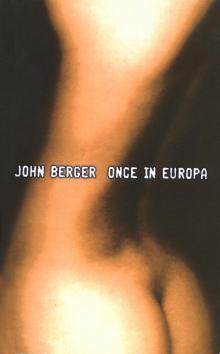 Once in Europa
Once in Europa To the Wedding
To the Wedding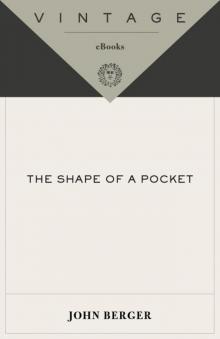 The Shape of a Pocket
The Shape of a Pocket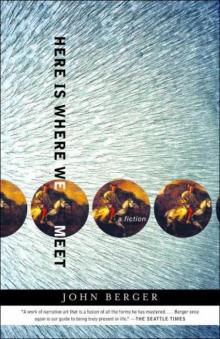 Here Is Where We Meet
Here Is Where We Meet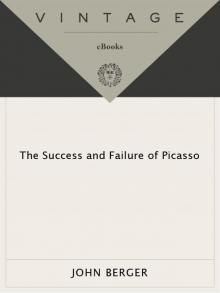 The Success and Failure of Picasso
The Success and Failure of Picasso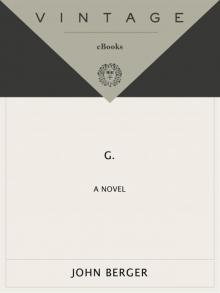 G.
G. Photocopies: Encounters
Photocopies: Encounters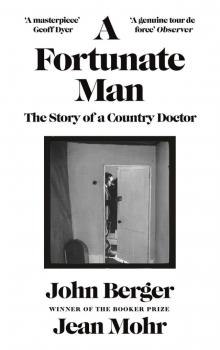 A Fortunate Man: The Story of a Country Doctor
A Fortunate Man: The Story of a Country Doctor And Our Faces, My Heart, Brief as Photos
And Our Faces, My Heart, Brief as Photos Titian
Titian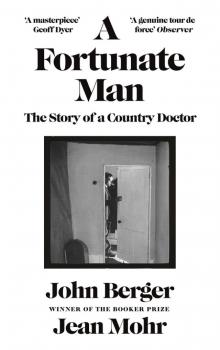 A Fortunate Man
A Fortunate Man Photocopies: Encounters (Vintage International)
Photocopies: Encounters (Vintage International)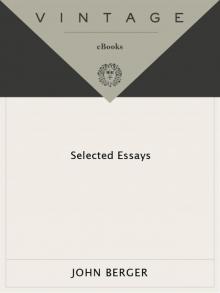 Selected Essays of John Berger
Selected Essays of John Berger